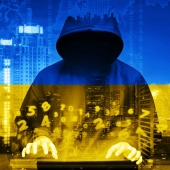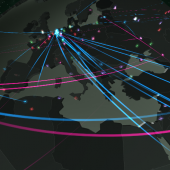-
Russian Sandworm hackers pose as hacktivists in water utility breaches
The Sandworm hacking group associated with Russian military intelligence has been hiding attacks and operations behind multiple online personas posing as hacktivist groups.
- April 17, 2024
- 01:08 PM
 0
0
-
Palo Alto Networks zero-day exploited since March to backdoor firewalls
Suspected state-sponsored hackers have been exploiting a zero-day vulnerability in Palo Alto Networks firewalls tracked as CVE-2024-3400 since March 26, using the compromised devices to breach internal networks, steal data and credentials.
- April 13, 2024
- 08:35 AM
 0
0
-
OpenAI blocks state-sponsored hackers from using ChatGPT
OpenAI has removed accounts used by state-sponsored threat groups from Iran, North Korea, China, and Russia, that were abusing its artificial intelligence chatbot, ChatGPT.
- February 15, 2024
- 10:56 AM
 1
1
-
Ukraine: Hack wiped 2 petabytes of data from Russian research center
The Main Intelligence Directorate of Ukraine's Ministry of Defense claims that pro-Ukrainian hacktivists breached the Russian Center for Space Hydrometeorology, aka "planeta" (планета), and wiped 2 petabytes of data.
- January 26, 2024
- 11:59 AM
 8
8
-
Hacking group 'ModifiedElephant' evaded discovery for a decade
Threat analysts have linked a decade of activity to an APT (advanced persistent threat) actor called 'ModifiedElephant', who has managed to remain elusive to all threat intelligence firms since 2012.
- February 10, 2022
- 03:02 PM
 0
0
-
Twitter removes 3,400 accounts used in govt propaganda campaigns
Twitter today announced the permanent removal of more than 3,400 accounts linked to governments of six countries running manipulation or spam campaigns.
- December 02, 2021
- 03:28 PM
 1
1
-
State-backed hackers breach telcos with custom malware
A previously unknown state-sponsored actor is deploying a novel toolset in attacks targeting telecommunication providers and IT firms in South Asia.
- October 18, 2021
- 01:28 PM
 0
0
-
Microsoft: Russian state hackers behind 53% of attacks on US govt agencies
Microsoft says that Russian-sponsored hacking groups are increasingly targeting US government agencies, with roughly 58% of all nation-state attacks observed by Microsoft between July 2020 and June 2021 coming from Russia.
- October 08, 2021
- 07:04 AM
 4
4
-
Twitter Removes State-backed Actors Conducting Information Campaigns
Twitter has removed another batch of state-sponsored actors performing information campaigns on Twitter. The detected operations announced today involved Qatar, Iran, Yemen, Ecuador, Saudi Arabia, Spain, China, and Hong Kong.
- September 20, 2019
- 10:17 AM
 1
1
-
State-Sponsored Actors Focus Attacks on Asia
Southeast Asia is the most actively attacked region, accordingly to Cyber Security firm, Group-IB. Their annual Hi-Tech Crime Trends Report 2018 advises: "In just one year, 21 state-sponsored groups were detected in this area, which is more than in the United States and Europe."
- November 14, 2018
- 09:15 AM
 0
0
















